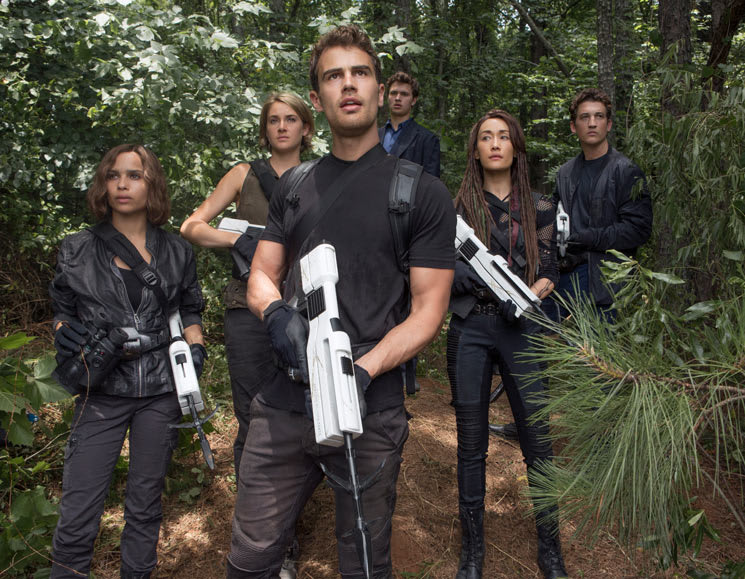The ways in which major movie studios scooped up seemingly every YA dystopian sci-fi series in the 2000s and began turning them out ad nauseam a couple years later is strangely similar to how major labels began signing any grunge band they could find from Seattle in the early '90s, in the sense that they all sound practically the same and it's nearly impossible to differentiate between them.
If you've never heard of American author Veronica Roth's Divergent series, don't stress, because the whole premise is fairly simple, and similar to something you've probably seen (or read) before: teenagers, living in a totalitarian society, discovers that they're different, have been fed incorrect truths about the world their entire lives, and fights the system to restore some sort of natural order. This is the template at the heart of almost every successful title out there (think The Hunger Games and The Maze Runner, and even more maligned adaptations like The Giver and this year's The 5th Wave), and with money rolling in no matter what the quality of the movie, it's hard to blame producers from delivering trilogy after nondescript trilogy (or, in this instance, tetralogy).
Sadly, given its young star power (Shailene Woodley, Zoë Kravitz, Miles Teller and Ansel Elgort among them) and the award-winning actors onboard (Octavia Spencer, Naomi Watts and Jeff Daniels), the latest entry in The Divergent Series (the third and penultimate instalment) will probably only delight pre-existing fans of the series and pre-teens looking to cut corners on their middle school book reports.
Following the revelations from the second film, Tris (Woodley) and her fellow allies attempt to escape the wall enclosing Chicago and finally find out the truth that lies on the other side. What they discover is the Bureau of Genetic Welfare, a modern utopia hidden behind the toxic (and seemingly uninhabitable) wasteland known as "The Fringe," run by a charismatic leader (David, played by Daniels) and occupied with an army of nearly perfect super soldiers. But something is missing, and Tris's perfect genetics apparently provide the answers.
The whole "Master Race" theme is pretty played out at this point, especially in sci-fi films for young adults. Because of this, the only thing that really separates these franchises from one another is the actors. Sadly, Allegiant finds its stars falling into the same old archetypes they play time and time again, even outside of big budget sci-fi franchises (Teller, as the loveable jerk; Elgort, as the vaguely handsome and harmless every man; and Woodley, a blank canvas for every average American girl who feels they're different); the special effects and designs, similarly, rarely dazzle.
As is often the case, the written word is a far more expressive medium in the mind's eye than a movie adaptation, and that's especially true, it turns out, if Robert Schwentke is behind the lens.
(eOne)If you've never heard of American author Veronica Roth's Divergent series, don't stress, because the whole premise is fairly simple, and similar to something you've probably seen (or read) before: teenagers, living in a totalitarian society, discovers that they're different, have been fed incorrect truths about the world their entire lives, and fights the system to restore some sort of natural order. This is the template at the heart of almost every successful title out there (think The Hunger Games and The Maze Runner, and even more maligned adaptations like The Giver and this year's The 5th Wave), and with money rolling in no matter what the quality of the movie, it's hard to blame producers from delivering trilogy after nondescript trilogy (or, in this instance, tetralogy).
Sadly, given its young star power (Shailene Woodley, Zoë Kravitz, Miles Teller and Ansel Elgort among them) and the award-winning actors onboard (Octavia Spencer, Naomi Watts and Jeff Daniels), the latest entry in The Divergent Series (the third and penultimate instalment) will probably only delight pre-existing fans of the series and pre-teens looking to cut corners on their middle school book reports.
Following the revelations from the second film, Tris (Woodley) and her fellow allies attempt to escape the wall enclosing Chicago and finally find out the truth that lies on the other side. What they discover is the Bureau of Genetic Welfare, a modern utopia hidden behind the toxic (and seemingly uninhabitable) wasteland known as "The Fringe," run by a charismatic leader (David, played by Daniels) and occupied with an army of nearly perfect super soldiers. But something is missing, and Tris's perfect genetics apparently provide the answers.
The whole "Master Race" theme is pretty played out at this point, especially in sci-fi films for young adults. Because of this, the only thing that really separates these franchises from one another is the actors. Sadly, Allegiant finds its stars falling into the same old archetypes they play time and time again, even outside of big budget sci-fi franchises (Teller, as the loveable jerk; Elgort, as the vaguely handsome and harmless every man; and Woodley, a blank canvas for every average American girl who feels they're different); the special effects and designs, similarly, rarely dazzle.
As is often the case, the written word is a far more expressive medium in the mind's eye than a movie adaptation, and that's especially true, it turns out, if Robert Schwentke is behind the lens.
